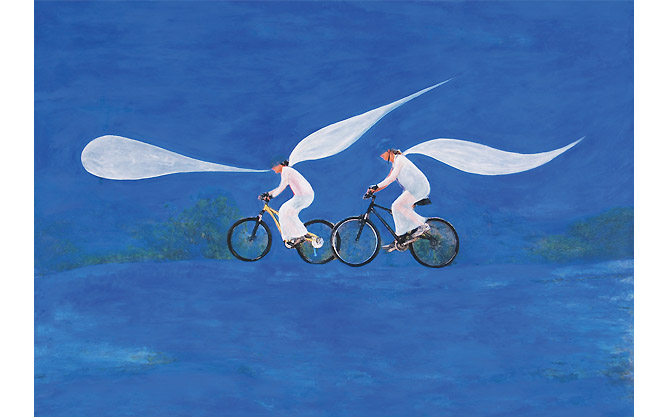Una ruota che sale e scende dallo sgabello

di LUCA SCARABELLI
2008
Questo progetto espositivo prende le mosse da un mio testo pubblicato nel catalogo di una mostra tenutasi qualche anno fa (era il 1996), in occasione dei mondiali di ciclismo su strada ospitati a Lugano, evento a cui parteciparono più di 40 artisti, per la maggior parte della Confederazione elvetica.
Di quella rassegna, ricordo in particolare l’opera di Riccardo Paracchini, presente anche in questa occasione, che uscendo dalla semplice descrizione dell’uomo sulla sella, con una lateralità molto emozionante, guardandosi alle spalle e pensando alla storia privata e quotidiana, propose un delicato lavoro dedicato a Coppi e alla sua Dama Bianca: un piccolo semplice quadro, un dipinto su tavola di legno intitolato “La Dama Bianca bacia Fausto Coppi all’arrivo della corsa”. Era un dipinto tutto rosso, appena venato da alcune leggere striature, realizzato con un rossetto.
Riccardo Paracchini è un artista molto attento e sensibile alle problematiche della tradizione e della dimensione emotiva dell’arte e coerentemente, ciclisticamente è per il velocipede: «Sono un mediocre velocipedista», dice di sé, proprio come Èmile Zola… ma un secolo e più dopo.
Riccardo Paracchini ha «realizzato una pittura su ciò che è arrivato». Nella tradizione della sua cifra stilistica, rielabora immagini trovate su riviste e quotidiani, quindi immagini prelevate dalla realtà comune, per inventare e plasmare, mescolando sacro e profano, angeli-ciclisti che portano la parola e l’annuncio per il mondo.
Questi angeli-pedalatori-annunciatori sono contraddistinti da una veste bianca e da sinuose ali bianche, e sono sospesi in volo al centro di un paesaggio azzurro che ha perso le coordinate spazio-temporali. Indossano il bianco della purezza e il bianco del verbo. “Sono” nella realtà del quadro. La Parola, fonte di verità, il fiato (l’animus) fonte di fatica e sacrificio, esce dalle figure e precede i gesti, e ogni pedalata. La sua pittura modifica così la realtà e le dà un significato diverso. Come dice Paracchini «tutti siamo un po’ messaggeri».
GOOGLE TRANSLATION
A wheel that goes up and down from the stool
This exhibition project takes its cue from a text of mine published in the catalogue of an exhibition held a few years ago (it was 1996), on the occasion of the road cycling world championship hosted in Lugano, an event in which more than 40 artists participated, mostly from the Swiss Confederation.
Of that exhibition, I particularly remember the work of Riccardo Paracchini, also present on this occasion, who, going beyond the simple description of the man on the saddle, with a very emotional laterality, looking back and thinking about his private and daily history, proposed a delicate work dedicated to Coppi and his White Lady: a small simple painting, a painting on a wooden panel entitled “The White Lady kisses Fausto Coppi at the finish of the race”. It was an all-red painting, just veined with a few light streaks, made with lipstick.
Riccardo Paracchini is an artist who is very attentive and sensitive to the problems of tradition and the emotional dimension of art and consistently, cycling-wise, he is for the velocipede: «I am a mediocre velocipedist», he says of himself, just like Èmile Zola… but a century and more later.
Riccardo Paracchini has «created a painting on what has arrived». In the tradition of his stylistic code, he reworks images found in magazines and newspapers, therefore images taken from common reality, to invent and shape, mixing the sacred and the profane, angel-cyclists who carry the word and the announcement for the world. These angel-pedalers-announcers are distinguished by a white dress and sinuous white wings, and are suspended in flight in the center of a blue landscape that has lost its space-time coordinates. They wear the white of purity and the white of the word. “I am” in the reality of the painting. The Word, source of truth, the breath (the animus) source of effort and sacrifice, comes out of the figures and precedes the gestures, and every pedal stroke. His painting thus modifies reality and gives it a different meaning. As Paracchini says, “we are all a bit of messengers.”
Questi angeli-pedalatori-annunciatori sono contraddistinti da una veste bianca e da sinuose ali bianche, e sono sospesi in volo al centro di un paesaggio azzurro che ha perso le coordinate spazio-temporali.
Altri Testi…